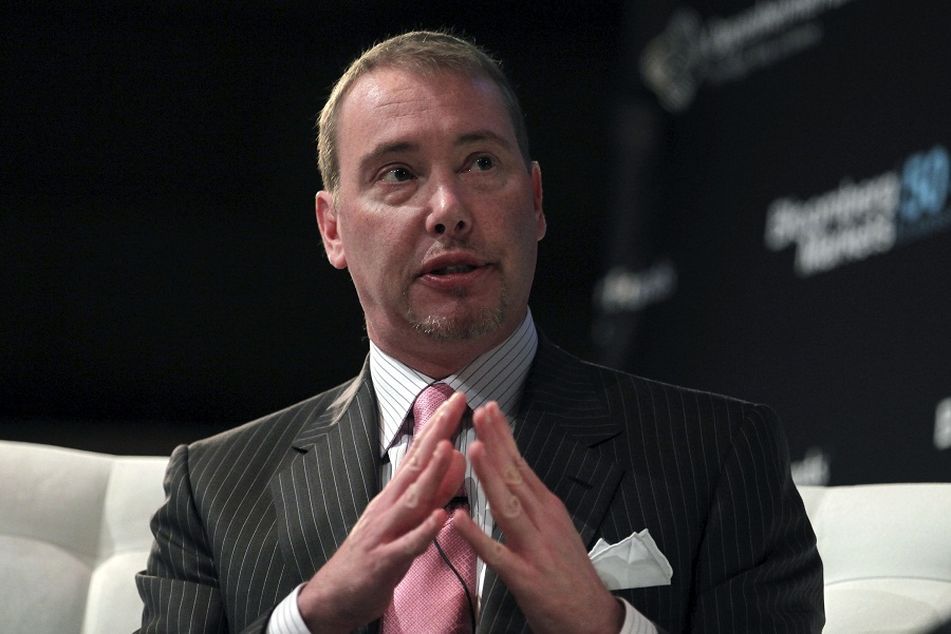DoubleLine’s Jeffery Gundlach says ‘blockhead’ Fed should postpone raising rates

$44.6 billion DoubleLine Total Return Fund manager says central bank should hold off on raising rates; gives a nod toward gold, India equities and shorting the dollar.
With the equity markets apparently running away from the surging U.S. dollar and global monetary policies pushing some bond yields into negative territory, DoubleLine Capital’s Jeffrey Gundlach can’t understand why the Federal Reserve Board is still considering raising interest rates this year.
“I’m afraid the Fed is intent on being a blockhead and raising rates, which would further strengthen the dollar,” he said Tuesday afternoon during a conference call with investors in his $44.6 billion DoubleLine Total Return Fund (DBLTX).
On the closely-watched pattern of “parsing of words” in Fed statements, Mr. Gundlach suggested that the Fed is likely to make a mistake by raising short-term interest rates before the U.S. economy is strong enough to absorb the adjustment.
“I don’t know why they don’t admit they don’t know what they’re going to do, and that they’re just going to react to data,” he said.
The online webcast presentation was a regular update on the DoubleLine flagship fund, but included Mr. Gundlach’s standard whirlwind tour through the global financial markets before the legendary portfolio manager got around to touting his category-beating fund, which he unabashedly described as “the best intermediate-term bond fund in the universe.”
The fund is up 0.62% so far this year, compared with 0.35% for the Barclays Aggregate Bond Index, and 0.52% for the intermediate-term bond category as tracked by Morningstar Inc.
In his analysis of global markets, Mr. Gundlach said he expects the European Central Bank’s quantitative easing program to send even more sovereign bonds into negative-yield territory.
“The front end of the yield curve is negative in many countries now, and with the European QE starting, it is quite likely more yields will go sharply negative,” he said. “With interest rates below zero, you now have a wealth tax.”
And low yields are not limited to government issues, Mr. Gundlach explained.
“Seventy percent of European companies have dividend yields higher than their corporate debt,” he said. “You wonder why companies don’t just borrow infinite amounts of money and retire their higher-yielding stock.”
On a day when the Dow Jones Industrial Average dropped more than 300 points, Mr. Gundlach cited the surging U.S. dollar as something that the markets do not like.
“The dollar strengthened today, and it is still accelerating, and that is being interpreted as negative in certain risk markets,” he said. “The dollar has been a world beater, and will continue to be a world beater until it becomes economically too painful, and maybe that’s what the stock market doesn’t like.”
As bold moves go, Mr. Gundlach said it would be contrarian to short the U.S. dollar, “but I say ‘don’t do it’, because sometimes the consensus is right.”
“Everybody is bullish on the dollar and it has been smoking hot since June, and it’s been going almost straight up since the breakout,” he said.
GO GOLD
If he had anything good to say about commodities, it was that “they have stopped falling, but they sure are weak,” he said. “And in non-dollar terms, gold is doing really well.” In a somewhat surprising call, Mr. Gundlach called for gold to “make it up to $1,400 an ounce at some point this year.” The precious metal is trading around $1,155 an ounce today.
“There’s a lot of gold buying by central banks,” he said. “Central bank gold-buying is at its second-highest level in 50 years.”
In the category of set-it-and-forget-it, Mr. Gundlach gave a nod toward India’s soaring equity market, which has been going virtually straight up since the middle of 2013.
The small universe of India equity mutual funds tracked by Morningstar is up 8.2% from the start of the year, on the heels of a 44.6% gain last year.
“For long-term investments, you should own the Indian stock market,” he said. “Put it in a safe, forget about it and open it in 20 years.”
Learn more about reprints and licensing for this article.








